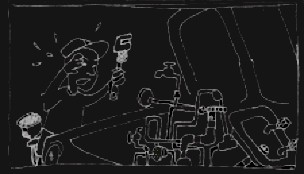When one wants the family car to run smoothly, the skill and attention of a good servicing automobile mechanic is crucial. We don’t take the car to a plumber. We want the most experienced car mechanic to be working on the car or  operating in a diligent supervisory role over those who have been well trained. We don’t want a person with limited hands-on experience to make critical decisions on how the engine ought to operate.
operating in a diligent supervisory role over those who have been well trained. We don’t want a person with limited hands-on experience to make critical decisions on how the engine ought to operate.
So ? As Bruce L Jones cites, “The one thing that we learn from history is that we don’t learn from history.”
We used to have schooling garages run by schooling mechanics until the plumbers took over.
The history of the school inspectorate in Queensland, Australia tells its own story when the maintenance of high school standards used to be of crucial importance. Those who knew what the operations of a school were like were supervising the activities at the chalk-face. These people had been at the chalk-face themselves for some time and had run schools in different parts of the state. Expert teachers, they were the outstanding mechanics of the system. It was once true of all states. They were called Inspectors, a much-derided term in early years, but turning into one of respect and appreciation towards the end of the 20th Century.
Paladins of the service, they knew what was going on within a classroom; they had been there and done that as teachers and principals; they had a close connection with curriculum development and ensured that Principals and teachers were able to contribute to it; they flew with pollen on the wings for they could recognise a good idea and were able to spread its use; they shared their evaluation of classroom performance with teachers in the same way that teachers were enjoined to share with their pupils. They expected results and their experience and seniority carried their own forms of clout. Clout is necessary in some circumstances and a network for curriculum excellence was developing in some Australian states that was efficient and effective. No question.
Based on the opinion of the Inspectorate, people were promoted through positions of authority to higher levels. From the classroom levels, applicants for positions as Deputy-Principal and for Principals of one-teacher schools were judged as to suitability for the position advertised. Principals of larger schools shared the opinion. Neophyte school administrators were chosen on merit, carefully. Occupants were expected to remain at an assigned level for a mandated minimum period of time before eligibility for the next promotion. The system was experience-based, similar to promotions in the armed forces. Occupants learned on the job at one level before feeling confident about the next. The whole Inspectorate gathered each year for an intense week or so to arrange all applicants in an order of merit for each position available. The system did not need bio-graphs or interviews because the capacity and potential of all applicants were well known.
Then about 1990, managerial egg-heads, whose knowledge of business and corporate structures was regarded as profound, moved in. They were everywhere and one of them in Queensland later became Prime Minister. They thought that the world of schooling was a clone of the world of business. They were in positions of influence and were persuasive in their use of managerial new-talk. Possessed by down-sizing and out-sourcing away went concern for the pupilling processes, and, with it, the control of quality and the press for high achievements. Corporate language took the place of school talk. Without reflection on our PM, he and his colleagues, sometimes called in to review government operations, just didn’t know what happens in schools; and thought that changes happened best from the top-down. In schooling circles it became an unadulterated debacle.
The general state of affairs has remained drastic and is likely to deteriorate further. The power folk think that the problem lies with the schools, instead of what they have done to them. Again, they are starting at the wrong end.

